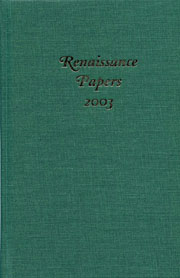Book contents
- Frontmatter
- Contents
- Renaissance Papers
- Homer, Erasmus, and the Problem of Strife
- William Tyndale Among the Demons
- The Printing of “this written book”: G.T. and H.W.'s Editorial Disputes in The Adventures of Master F.J.
- George Puttenham as Comedic Artificer
- Amoret and Scudamour Woo and Wed: Two Courtly Histories and a Stalemate
- Strange Bedfellows: “The Churching of Women” and The Taming of the Shrew
- “Romans, countrymen, and lovers”: Performing Politics, Sovereign Amity and Masculinity in Julius Caesar
- “Rouse Up a Brave Mind”: The Merchant of Venice and Social Uprising in the 1590s
- Revenge Tragedy and Elizabeth Cary's Mariam
- “very worthely sett in printe”: Writing the Virginia Company of London
“Romans, countrymen, and lovers”: Performing Politics, Sovereign Amity and Masculinity in Julius Caesar
Published online by Cambridge University Press: 12 September 2012
- Frontmatter
- Contents
- Renaissance Papers
- Homer, Erasmus, and the Problem of Strife
- William Tyndale Among the Demons
- The Printing of “this written book”: G.T. and H.W.'s Editorial Disputes in The Adventures of Master F.J.
- George Puttenham as Comedic Artificer
- Amoret and Scudamour Woo and Wed: Two Courtly Histories and a Stalemate
- Strange Bedfellows: “The Churching of Women” and The Taming of the Shrew
- “Romans, countrymen, and lovers”: Performing Politics, Sovereign Amity and Masculinity in Julius Caesar
- “Rouse Up a Brave Mind”: The Merchant of Venice and Social Uprising in the 1590s
- Revenge Tragedy and Elizabeth Cary's Mariam
- “very worthely sett in printe”: Writing the Virginia Company of London
Summary
Much of the recent criticism on Julius Caesar has focused on the language of the play, with essentially two main focal points. The first concerns the function of reflexivity in Renaissance drama: one such argument being that it “control(s) the audience's degree of involvement in the stage illusion.” This contention, of course, harkens back to the works of both Samuel Johnson and Coleridge and their comments on the audience's awareness of the play as “staged” by “players.” Another significant reading of language in Julius Caesar, derived from J.L. Austin, focuses on rhetoric and the manner in which language itself is specifically (intentionally) performative in the Roman world of the play. Cicero offers us a thesis for the play in his only speaking scene: “Indeed it is a strange-disposed time. / But men may construe things after their fashion / Clean from the purpose of the things themselves” (1.3.33-35). Men not only may but also do “construe things after their fashion” and, indeed, nothing is but speaking makes it so. In fact, it seems as though the figure of Cicero is ushered into this scene for the express purpose of speaking these lines. Gayle Greene offers further commentary on the importance of rhetoric and how it operates in the play as a “theme as well as a style: accorded prominence by structure and imagery, it is integral to characterization, culture, and to the central political and epistemological concerns.”
- Type
- Chapter
- Information
- Renaissance Papers 2003 , pp. 99 - 118Publisher: Boydell & BrewerPrint publication year: 2004

